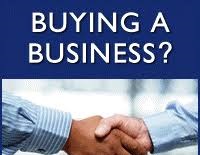The price paid (the investment) for a business should be less than the expected ROI (Return on Investment) from owning and operating the business model and assets.
Buying a business is about investing money for a return, for future profits, and a resale price that exceeds the business purchase price.
Buyers may be:
- employees — this is known as a management buyout
- competitors
- suppliers or customers
- entrepreneurs
- investment groups.
1.0 BUSINESS PURCHASE PRICE
The price a business is bought and sold for is the price the Buyer and Seller agree on.
Otherwise, a sale price is an approximation based on the ROI (Return on Investment) profitability that comparable businesses are sold for. For example, a business sold for $2 Million dollars on expected annual profits of $650,000 is sold on an annual 32.5% ROI basis.
The expected future business profits and resale price should exceed (payback) the purchase price after an appropriate amount of time. The higher the ROI, the quicker the payback.
Most SMB (Small and Medium sized Businesses) are Asset sales.
On the standard NZ AGREEMENT FOR SALE AND PURCHASE OF A BUSINESS, the total sale price is broken down into 3 parts – Tangible, Assets, Stock in Trade, and Intangible Assets.
- Tangible assets are the physical assets needed to operate the business e.g. premises, premises fittings, equipment (including machines and vehicles).
- Stock in Trade are the products (including the raw materials for making the products) sold by the business.
- Intangible assets represent the balance of the total sale price other than Tangible assets + Stock. That includes intellectual property, contractual rights, and goodwill. It is the agreed sale price difference (from Tangibles and Stock) for the prospects (opportunities and threats/risk) of the business to maintain, exceed, or reduce the profits and ROI of the business.
Business can be also be sold (in full or in part) as Shareholder Equity, a share (rather than ownership of specific assets) of ownership of the business ROI.
2.0 BUYING A BUSINESS PROCESS

The Seller (or their business broker) should provide the Buyer with the information needed to make a buying decision.
Assets should be identified as Tangible, Stock, and Intangibles along with asking prices.
An Investment Memorandum (business profile for small businesses) should describe how the business model and assets operate to earn the profits claimed & why profits are expected to continue and/or grow under new ownership, explain what makes customers continue to pay the business for their products and services, the strengths and weaknesses of the assets and business model to prosper in the market’s opportunities and threats.,
Proof of claims should be provided e.g. Financial Statements and GST reports proving profits earned.
.
2.1 BUYING A BUSINESS BEST PRACTICES
Sooner or later a business buyer should expect disclosure of the information, seller behavior, and agreement to the points numbered below.
Information should be acquired in stages, starting with an Investment Memorandum (business profile for small businesses).
A business profile summarizes the information listed below. An information memorandum provides more detail.
Further details (e.g. Financial Statements, GST returns and bank statements) are normally provided after serious buying interest is indicated or during due diligence after making a conditional offer to purchase.
- An asking price.
2. Consistent facts about what’s for sale.
- A list of assets with asking prices
- A summary of historical financials, including working capital needed for receivables minus creditors, financial performance based on the Financial Statements and GST returns
- Financial Statements and GST returns
- A copy of contracts needed for continuing the current going concern business, including leases and employment agreements
3. A strategic outline of the prospects for future ROI.
- Describing the current situation of business assets and operations, including about business premises, processes, and staff, plant and equipment, products and services, suppliers, competitors
- Providing a good reason for selling
- A strategic SWOT (Strengths, Weaknesses, Opportunites, and Threats)
4. The Seller continuing to operate the business as usual, in good repair, for continued performance and best future value.
5. The Seller agreeing to an appropriate handover and training period.
The Seller agreeing to an appropriate non-compete period.
If you’re buying through a licensed business broker, remember their licensing rules require them to:
- Act in good faith and deal fairly with all parties engaged in a transaction
- Not provide false information, nor withhold information that should by law or in fairness be provided
- Not mislead as to price expectations
- Not engage in any conduct that would put prospective parties to a sales transaction under undue or unfair pressure
They’re also licensed to draft an AGREEMENT FOR SALE AND PURCHASE OF A BUSINESS
3.0 Getting Technical and Legal Advice & Completing A Business Purchase Transaction
Negotiating a business purchase is time-consuming and specialist work.
A licensed business broker can draft a conditional ASPB (an AGREEMENT FOR SALE AND PURCHASE OF A BUSINESS).
Their licensing rules require them to recommend and give parties a reasonable opportunity to take legal and technical advice before signing an ASPB.
A buyer should seek expert advice – technical and legal for evaluating and negotiating the purchase price, terms and conditions.
An accountant and/or business broker and/or lawyer can be paid to provide advice regarding the price relevant to expected ROI & to help negotiate the purchase price, terms, and conditions.
aAgents.Biz Business Brokers can help business buyers by Appraising Business Value, Valuing a Business, acting as a Business Buyer’s Agent.
Finally, advice from a licensed-to-practice lawyer should be sought before going unconditional on an ASPB.
